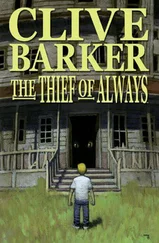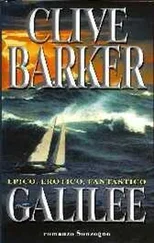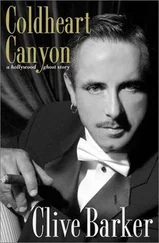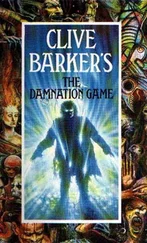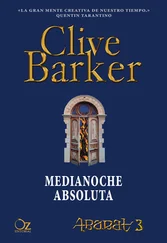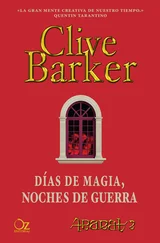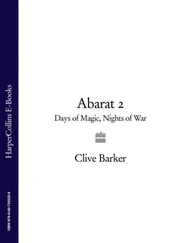Clive Barker - Sacrament
Здесь есть возможность читать онлайн «Clive Barker - Sacrament» — ознакомительный отрывок электронной книги совершенно бесплатно, а после прочтения отрывка купить полную версию. В некоторых случаях можно слушать аудио, скачать через торрент в формате fb2 и присутствует краткое содержание. Жанр: Фантастика и фэнтези, на английском языке. Описание произведения, (предисловие) а так же отзывы посетителей доступны на портале библиотеки ЛибКат.
- Название:Sacrament
- Автор:
- Жанр:
- Год:неизвестен
- ISBN:нет данных
- Рейтинг книги:5 / 5. Голосов: 1
-
Избранное:Добавить в избранное
- Отзывы:
-
Ваша оценка:
- 100
- 1
- 2
- 3
- 4
- 5
Sacrament: краткое содержание, описание и аннотация
Предлагаем к чтению аннотацию, описание, краткое содержание или предисловие (зависит от того, что написал сам автор книги «Sacrament»). Если вы не нашли необходимую информацию о книге — напишите в комментариях, мы постараемся отыскать её.
Sacrament — читать онлайн ознакомительный отрывок
Ниже представлен текст книги, разбитый по страницам. Система сохранения места последней прочитанной страницы, позволяет с удобством читать онлайн бесплатно книгу «Sacrament», без необходимости каждый раз заново искать на чём Вы остановились. Поставьте закладку, и сможете в любой момент перейти на страницу, на которой закончили чтение.
Интервал:
Закладка:
'Where the hell do we start?' Will wondered aloud. 'I can't even pronounce half these names.'
There was a glorious poetry in the words, however: Balephuil and Balephetrish, BaileMheadhonach and Cornaigmore; Vaul and Gott and Kenavara. And they lost little of their power in translation: Balephuil was the Town of the Marsh, Heylipoll, the Holy Town, Bail-Udhaig, the Town of Wolf Bay.
'If nobody's got any better ideas,' Will said, 'I suggest we start here.' He pointed to Baile-Mheadhonach.
'Any particular reason?' Frannie wanted to know.
'Well, it's almost in the middle of the island, for one thing-' In fact that was its unglamorous translation: Middle Town. 'And it's got its own cemetery, look.' There was a cross to the south of the village, and beside it the words Cnoc a' Chlaidh, translated as Christian burial ground. 'If Simeon was buried here, we may as well start out by looking for his grave.' He glanced over his shoulder at Rosa. She'd put down the booklet, and was staring out of the window, the fixedness of her expression such that Will looked away immediately so as not to disturb her meditations. 'Let's just go,' he said to Frannie. 'We can follow the coast road west as far as Crossapol. Then we make a right inland.'
Frannie eased the car out into what would have been the flow of traffic if there'd been any traffic, and within perhaps a minute they had passed
the outskirts of Scarinish, and were on the open road; a road so straight and empty she could have driven blindfolded and more than likely brought them to Crossapol. V
There were amongst the Western isles places of great historical and mythological significance; where battles had been fought and princes hid, and stories made that haunted listeners still. Tiree was not amongst them. The island had not passed an entirely uneventful life; but it had been at best a footnote to events that flowered in their full splendour in other places.
There was no more obvious example of this than the exploits of St Columba, who had in his time carried the Gospel throughout the Hebrides, founding seats of devotion and learning on a number of islands. Tiree was not thus blessed, however. The good man had lingered on the island only long enough to curse a rock in Gott Bay for the sin of letting his boat's mooring rope slip. It would be henceforth barren, he declared. The rock was dubbed Mallachdaig, or Little Cursed One, and no seaweed had grown on it since. Columba's associate St Brendan had been in a more benign mood during his fleeting visit, and had blessed a hill, but if the blessing had conferred some inspirational power on the place nobody had noticed: there had been no revelations or spontaneous healings on the spot. The third of these visiting mystics, St Kenneth, had caused a chapel to be built in the dunes near the township of Kilkenneth, which had been so named in the hope of persuading him to linger. The ruse had failed. Kenneth had gone on to greater things, and the dunes more persuaded by wind than metaphysics - had subsequently buried the chapel.
There were a handful of stories through which St Columba and his gang did not wander, all of which remained part of the anecdotal landscape, but most of them were dispiritingly domestic in scale. A well on the side of Beinn Hough, for instance, called Tobar nan naoi beo, the Well of the Nine Living, because it had miraculously supplied a widow and her eight homeless children with a lifetime's supply of shellfish. A pool close to the shore at Vaul where the ghost of a girl who had drowned in its depths could be seen on moonless nights, singing a lonely lullaby to lure living souls into the water with her. In short, nothing out of the ordinary; islands half the size of Tiree boasted legends far more ambitious.
But there was a numinosity here none of the rest of the isles possessed, and at its heart a phenomenon which would have turned St Columba from a gentle meditative into a wild-eyed prophet had he witnessed it. In fact, this wonderment had not yet come to pass when the saint had hopscotched through the islands, but even if it had he would most likely have been denied sight of it, for those few islanders who had glimpsed the miracle (and presently living they numbered eight) never mentioned the subject, not even to those they loved. This was the great secret of their lives, a thing unseen, yet more certain than the sun, and they were not about to dilute its enchantment by speaking of it. In fact, many of them limited their own contemplation of what they'd sensed, for fear of exhausting its power to enrapture them. Some, it was true, returned to the place where they'd been touched in the hope of a second revelation, and though none of them saw anything on their return visits, many were granted a certainty that kept them content for the rest of their lives: they left the place with the conviction that what they had failed to see had seen them. They were no longer frail mortals, who would live their lives and pass away. The power on the hill at Kenavara had witnessed them, and in that witnessing had drawn them into an immortal dance.
For it lived in the island's very being, this power; it moved in sand and pasture and sea and wind, and the souls it saw became part of these eternals, imperishable. Once witnessed, what did a man or woman have to fear? Nothing, except perhaps the discomforts that attended death. Once their corporeal selves were shed, however, they moved where the power moved, and witnessed as it witnessed, glory on glory. When on summer nights the Borealis drooped its colour on the stratosphere, they would be there. When the whales came to breach in exaltation, they would rise, too. They would be with the kittiwakes and the hares and with every star that trembled on Loch an Eilein. It was in all things, this power. In the sandy pastures adjoining the dunes (or the machair as it was called in Gaelic); and in the richer, damper fields of the island's midst, where the grass was lush and the cattle grazed themselves creamy.
It did not much concern itself with the griefs and travails of those men and women who never saw it, but it kept a tally of their comings and goings. It knew who was buried in the churchyards at Kirkapol and Vaul; it knew how many babies were born each year. It even watched the visitors, in a casual fashion, not because they were as interesting as whales or kittiwakes, they weren't, but because there might be amongst them some soul who would do it harm. This was not beyond the bounds of possibility. It had been witnessing long enough to have seen stars disappear from the heavens. It was not more permanent than they.
Rosa said: 'Stop the car.'
Frannie did as she was instructed.
'What is it?' Will asked, turning round to look at Rosa.
Her eyes were welling with tears as he watched, while a smile befitting a painted Virgin rose on her lips. She reached out and fumbled with the door-handle, but in her present distracted state she couldn't get it open. Will was out of the car in a heartbeat, and opening the door for her. They were on an empty stretch of road, with unfenced pasture off to the right, grazed by a few sheep, and to their left a band of flower-studded grass which became a gently sloping beach. Overhead, terns wheeled and darted. And much, much higher, a jet on its way west, reflecting earthlight off its silver underbelly. He saw all this in a moment or two, his senses quickened by something in the air. The fox moved in him, turning its snout to the sky and sensing whatever Rosa had sensed.
He didn't ask her what it was. He simply waited while she scanned the horizon. Finally she said: 'Rukenau's here.'
'Alive?'
'Oh yes, alive. Oh my Lord, alive.' Her smile darkened. 'But I wonder what he's become after all these years.'
'Do you know where we can find him?'
She held her breath for a moment. Frannie had got out of the car by now, and started to speak. Will put his finger to his lips. Rosa, meanwhile, had started to walk away from the car, into the pasture. There was so much sky here; a vast, empty blue, widening before Will as his eyes grew ambitious to take it in. What have I been doing all these years, he thought; putting boxes around little corners of the world? It was such a lie to do that; to stand under skies as wide as this and record instead some mote of suffering. Enough of that.
Читать дальшеИнтервал:
Закладка:
Похожие книги на «Sacrament»
Представляем Вашему вниманию похожие книги на «Sacrament» списком для выбора. Мы отобрали схожую по названию и смыслу литературу в надежде предоставить читателям больше вариантов отыскать новые, интересные, ещё непрочитанные произведения.
Обсуждение, отзывы о книге «Sacrament» и просто собственные мнения читателей. Оставьте ваши комментарии, напишите, что Вы думаете о произведении, его смысле или главных героях. Укажите что конкретно понравилось, а что нет, и почему Вы так считаете.

